September 27, 2025

The article outlines five essential steps for effectively preparing for the BAS mock exam, a critical component for achieving success in BCBA certification.
Collectively, these steps empower candidates to face the examination with assurance and competence.
Understanding the intricacies of the BAS mock exam is crucial for aspiring behavior analysts aiming for BCBA certification. With national pass rates hovering between 60% and 70%, it is essential for candidates to confront challenges such as test anxiety and poor time management. This guide outlines essential strategies to enhance preparation, from grasping the exam structure to gathering effective study materials and creating a structured study schedule.
How can candidates overcome these common hurdles to ensure success on exam day?
The BAS practice assessment serves as a vital resource for individuals preparing for the BCBA certification, closely simulating the actual testing environment. With multiple-choice questions that encompass various aspects of behavior analysis, it’s essential to familiarize yourself with the format, including the total number of questions, time constraints, and specific content areas evaluated. This understanding enables candidates to pinpoint key focus areas and develop a targeted preparation strategy.
Recognizing that the primary aim of these practice tests is to gauge preparedness and identify areas for improvement can significantly enhance your learning approach. Aiming for a passing score of at least 70% is advisable, as it provides a reliable benchmark for assessing your readiness and guiding your future study efforts.
Considering that the national pass rate for the BCBA exam generally falls between 60% and 70%, utilizing mock exams becomes increasingly crucial for ensuring comprehensive preparation. As behavior analyst Fayge Orzel notes, 'Many candidates fail due to test anxiety, poor time management, and reliance on ineffective learning techniques.'
Therefore, integrating effective study methods such as active recall and spaced repetition, along with hands-on fieldwork experience, can substantially boost your chances of success.
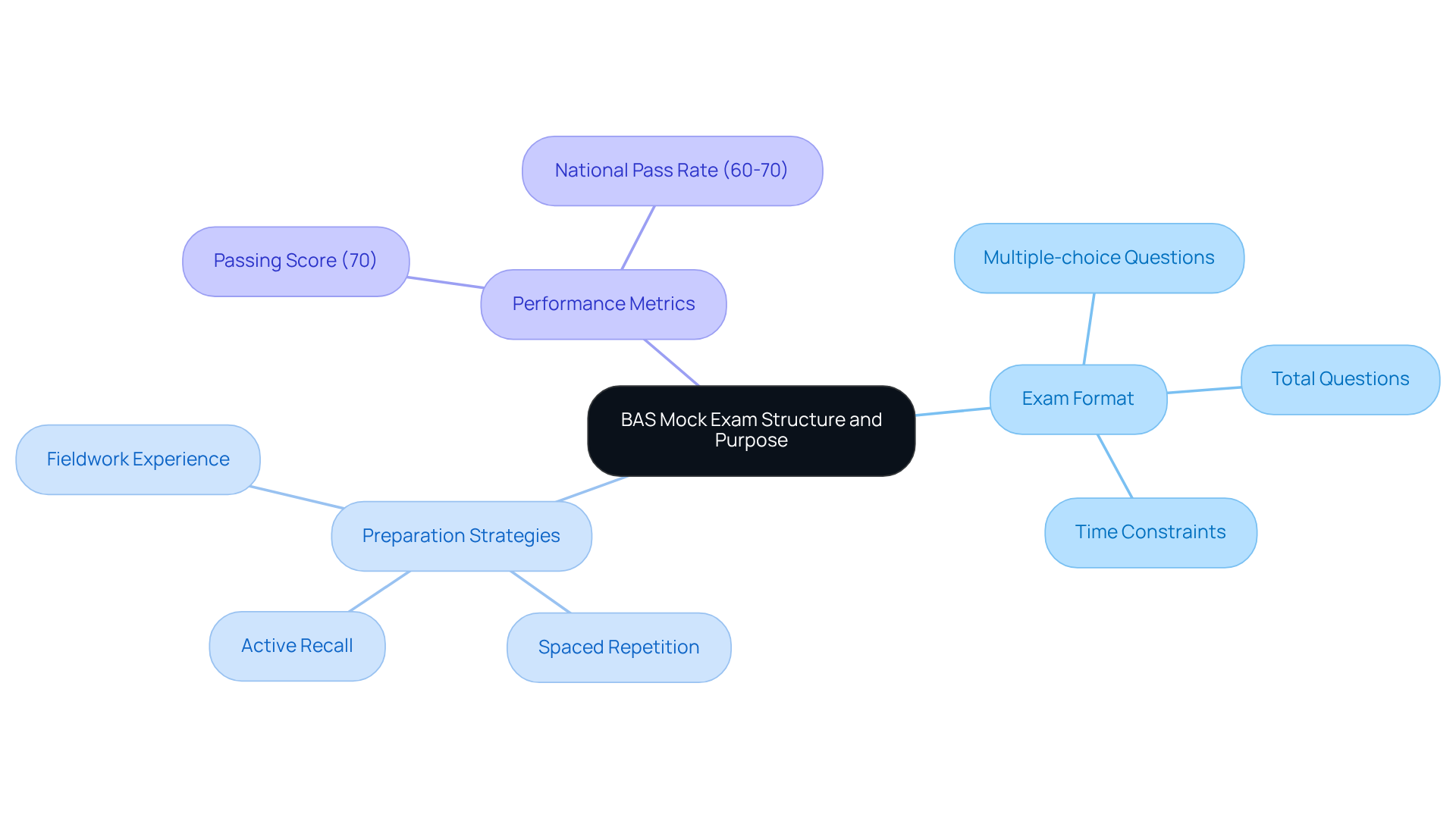
To prepare effectively for the certification test, it is crucial to gather a diverse array of study materials that cater to different learning styles. Vital materials include the 'Applied Behavior Analysis' textbook by Cooper, which provides fundamental knowledge, and the 'Pass the Big ABA Assessment' resource, recognized for its comprehensive practice questions and simulated tests. Furthermore, the PTB ABA Study Manual is strongly advised for its thorough analysis of the BCBA task list, rendering it a useful resource for test preparation. Online platforms like StudyABA offer valuable bas mock exams that simulate the actual test environment, enhancing familiarity with the exam format.
Have you considered how group discussions or forums can significantly enhance your preparation? Research suggests that individuals who participate in cooperative learning sessions frequently achieve superior results, as they can exchange insights and strategies, enhancing their comprehension of intricate ideas. Indeed, candidates who engage in group sessions have a higher pass rate compared to those who prepare independently. Additionally, flashcards serve as a powerful tool for memorizing key terms and principles, making them an effective addition to your learning arsenal.
It's essential to ensure that all materials are current and aligned with the latest assessment standards. Consistently refreshing your materials and seeking new learning tools can assist in sustaining a thorough and effective preparation strategy. As one accomplished behavior analyst observed, "The most effective method to prepare for the certification assessment is to create a personal learning plan that includes diverse materials." Another behavior analyst emphasized, "Using a mix of study materials helped me grasp difficult concepts more easily." This customized approach can significantly improve your odds of achievement on assessment day.
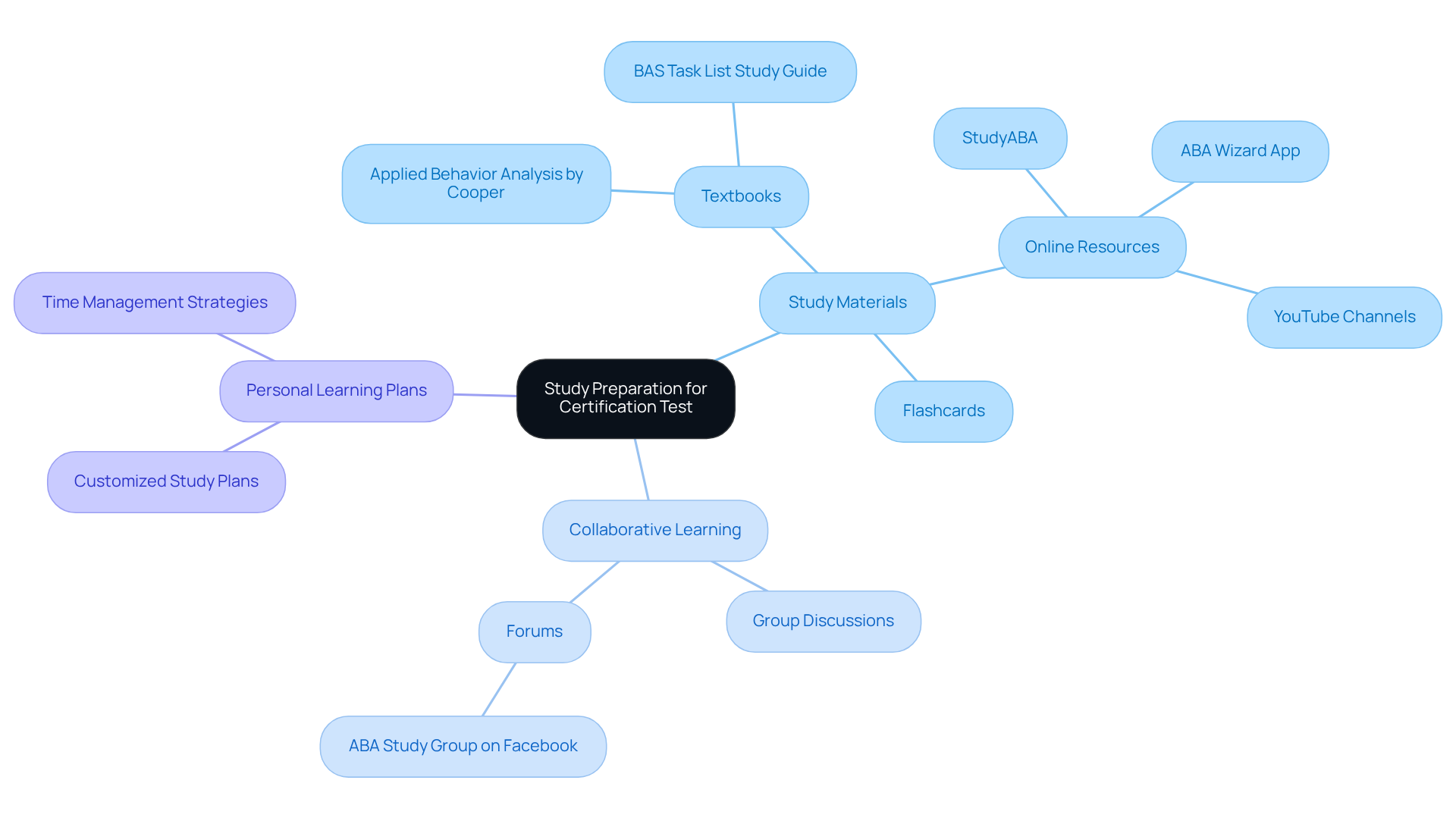
To effectively prepare for the BCBA exam, begin by evaluating the time available before the exam and identifying the key topics to cover. An organized learning timetable is crucial; divide your learning sessions into manageable segments, allocating specific days to various subject areas. For instance:
Incorporate regular breaks to prevent burnout and improve information retention. Research indicates that most candidates require between 300 to 500 hours of concentrated preparation. Those with prior ABA experience typically need about 300 hours, while candidates lacking such experience should target 500 hours. Therefore, plan accordingly to meet this requirement and consider a duration of three to six months for thorough preparation.
Utilize digital calendars or study apps to track your progress and adjust your schedule as necessary. Aim to review each topic multiple times in preparation for the test, ensuring a comprehensive understanding of the material. Furthermore, allocate time for mock exam practice tests to replicate the testing atmosphere, which is essential for developing confidence and familiarity with the test structure. As highlighted by educators, 'The BCBA assessment evaluates your comprehension of ABA principles and their practical application, so it necessitates a well-planned, strategic approach to studying.' A well-organized preparation strategy not only improves retention but also significantly increases the chances of success on the assessment.
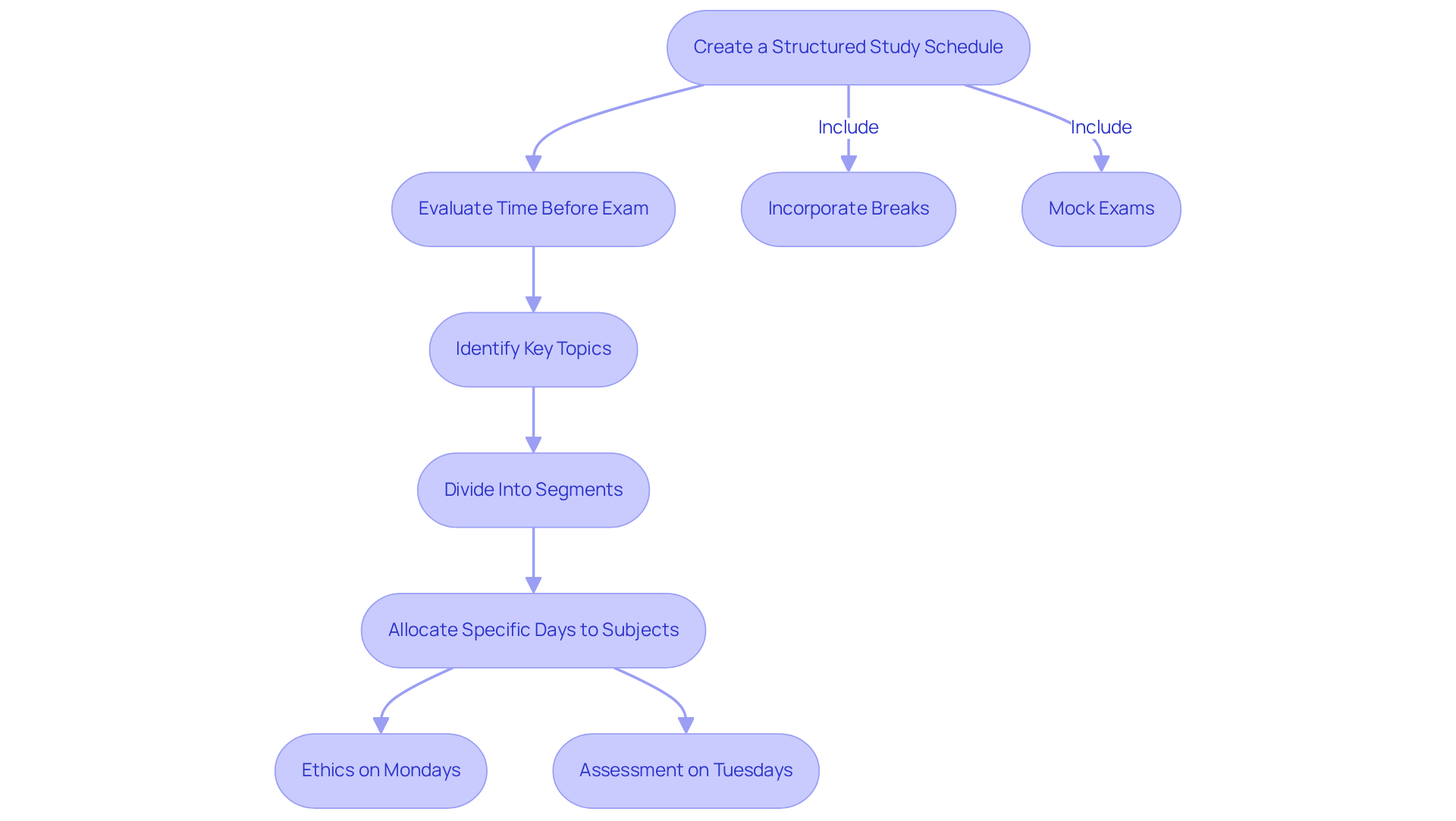
Incorporating a bas mock exam into your study routine is essential for measuring your understanding of the material. Start with comprehensive practice assessments like the bas mock exam that closely replicate the real testing environment, aiming for a passing score of at least 70%. Notably, in 2020, the first-time pass rate for BCBA applicants was only 65%, underscoring the competitive nature of the assessment and the necessity for thorough preparation.
After each practice test, engage in a detailed review of your answers, particularly concentrating on the questions you missed. This review process is critical for pinpointing weaknesses and reinforcing your knowledge base. Many applicants have reported significant improvements in their performance after meticulously analyzing their practice test results, highlighting the effectiveness of this approach. In fact, retake candidates achieved a mere 15% pass rate in 2020, which emphasizes the importance of effective study techniques, including practice assessments.
Utilizing online platforms that offer detailed explanations for each answer can further enrich your learning experience. These resources often clarify intricate concepts and provide insights into the rationale behind correct answers. Regularly scheduled bas mock exams not only boost your confidence but also hone your test-taking skills, equipping you to better manage the pressures of the actual test.
As one behavior analyst noted, 'The more practice tests I completed, the better I comprehended the material and the more assured I felt on test day.' By adhering to a structured learning schedule and dedicating sufficient time to preparation, you can significantly enhance your chances of success on the certification test.
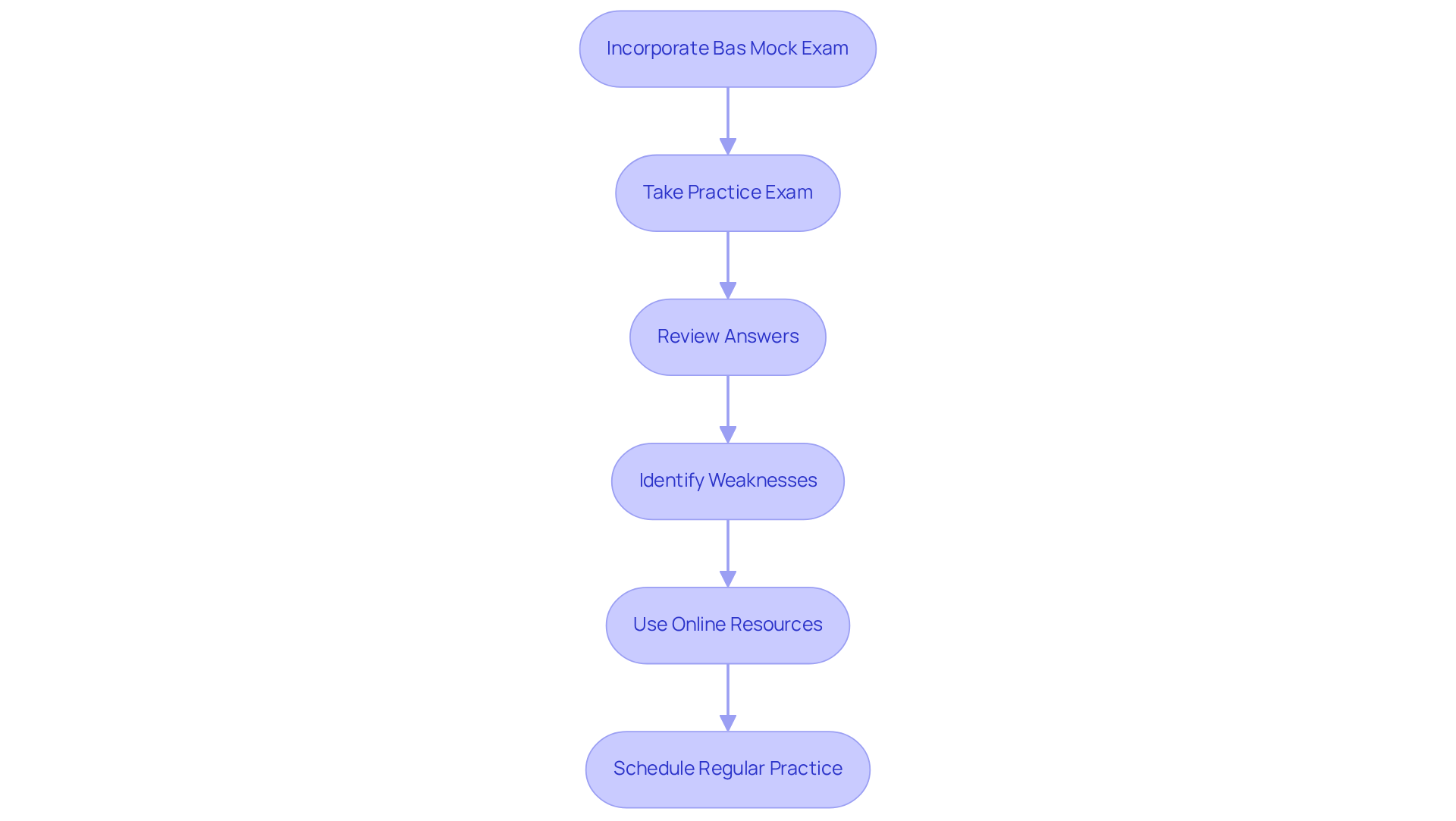
Preparing for the BCBA assessment presents various challenges, including time management, difficulty grasping certain concepts, and test anxiety. To effectively manage your time, prioritize your learning sessions and eliminate distractions. Consider dividing your learning material into weekly modules and utilizing question banks that reflect exam difficulty. If you struggle with specific topics, seek assistance from a mentor or join a study group, fostering collaborative learning and deeper understanding.
Test anxiety is a common hurdle for many candidates. Statistics indicate that a significant number of ABA students experience this issue, potentially hindering their performance. To tackle test anxiety, practice relaxation methods like deep breathing or visualization prior to taking the bas mock exam. Maintaining your physical health is equally important; ensure you get adequate sleep, eat nutritious meals, and engage in regular exercise to support your overall well-being.
By identifying and tackling these obstacles early, you can foster a positive attitude and maintain concentration on your objective of succeeding in the assessment. Implementing these strategies will enhance your preparation and boost your confidence as you approach the exam.
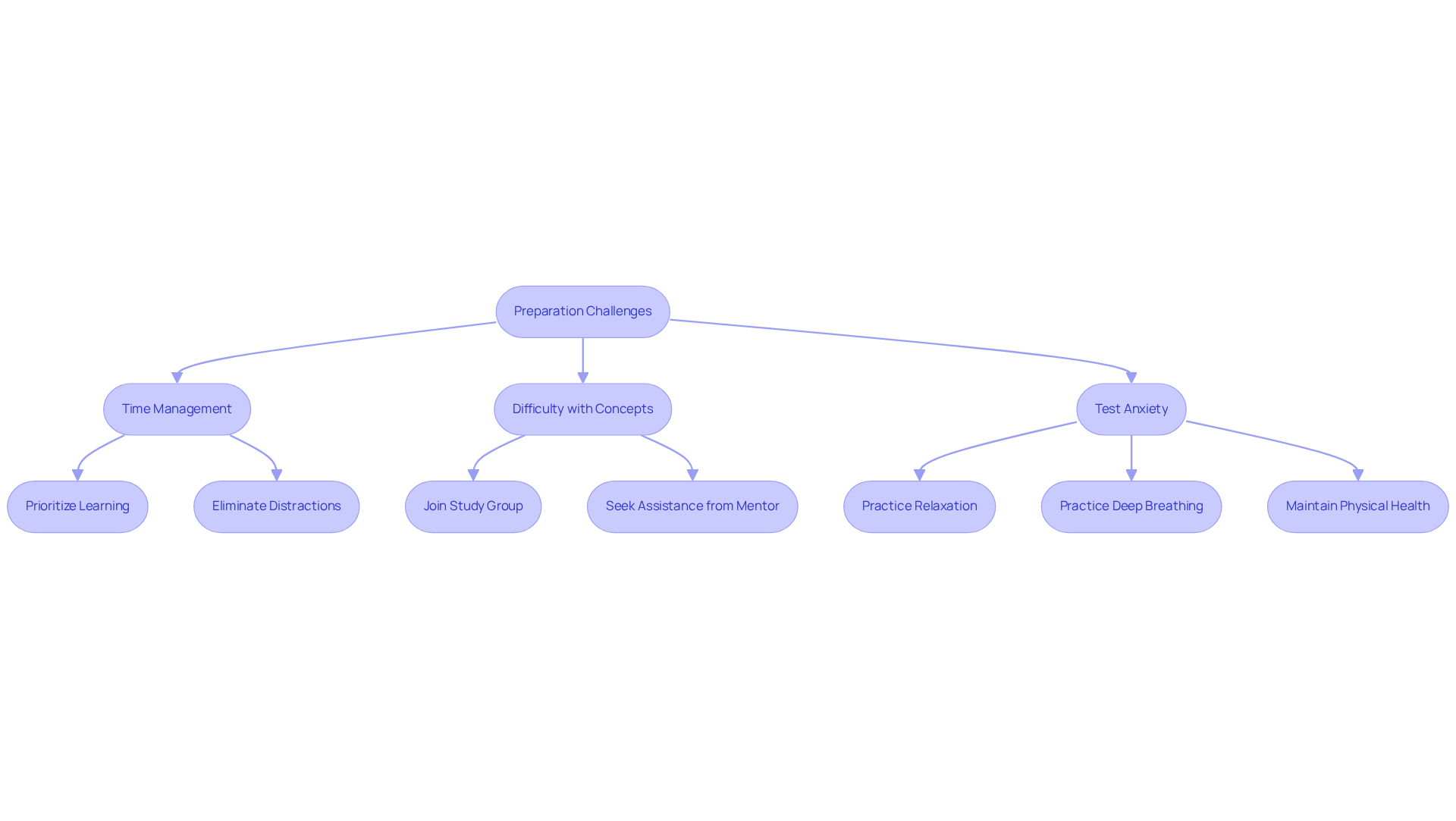
Mastering the preparation for the BAS mock exam is crucial for anyone aspiring to achieve BCBA certification. Understanding the exam's structure, gathering the right study materials, creating a structured study schedule, utilizing practice exams, and addressing common preparation challenges significantly enhance candidates' readiness and confidence for the actual test.
Key strategies include:
The importance of practice exams cannot be overstated; they provide valuable insights into personal strengths and weaknesses, enabling candidates to focus their efforts where needed most.
Ultimately, acing the BAS mock exam is not merely about passing a test; it’s about developing a profound understanding of behavior analysis principles that will serve candidates well in their future careers. By taking proactive steps to prepare effectively, individuals can transform potential challenges into opportunities for growth, ensuring they are not only ready for the exam but also equipped for success in the field of behavior analysis.
What is the purpose of the BAS practice assessment?
The BAS practice assessment serves as a vital resource for individuals preparing for the BCBA certification, closely simulating the actual testing environment and helping candidates gauge their preparedness.
What should candidates know about the BAS mock exam structure?
Candidates should familiarize themselves with the format of the exam, including the total number of questions, time constraints, and specific content areas evaluated, to develop a targeted preparation strategy.
What is a recommended passing score for the BAS practice assessment?
Aiming for a passing score of at least 70% is advisable, as it provides a reliable benchmark for assessing readiness and guiding future study efforts.
What is the national pass rate for the BCBA exam?
The national pass rate for the BCBA exam generally falls between 60% and 70%.
What are common reasons candidates fail the BCBA exam?
Many candidates fail due to test anxiety, poor time management, and reliance on ineffective learning techniques.
What study methods can enhance preparation for the BCBA exam?
Integrating effective study methods such as active recall, spaced repetition, and hands-on fieldwork experience can substantially boost chances of success.
What essential study materials are recommended for BCBA exam preparation?
Recommended materials include the 'Applied Behavior Analysis' textbook by Cooper, the 'Pass the Big ABA Assessment' resource, and the PTB ABA Study Manual.
How can group discussions enhance exam preparation?
Participating in cooperative learning sessions can improve comprehension of intricate ideas and often leads to superior results compared to independent study.
What tools can be used for memorizing key terms and principles?
Flashcards are a powerful tool for memorizing key terms and principles, making them an effective addition to the learning arsenal.
Why is it important to ensure study materials are current?
It's essential to ensure that all materials are current and aligned with the latest assessment standards to sustain a thorough and effective preparation strategy.
Our expert recruitment strategies and AI-driven sourcing ensure that you receive top-notch candidates quickly, without compromising on quality. Whether you’re looking for BCBAs, Clinical Directors, or RBTs, we’ve got you covered.